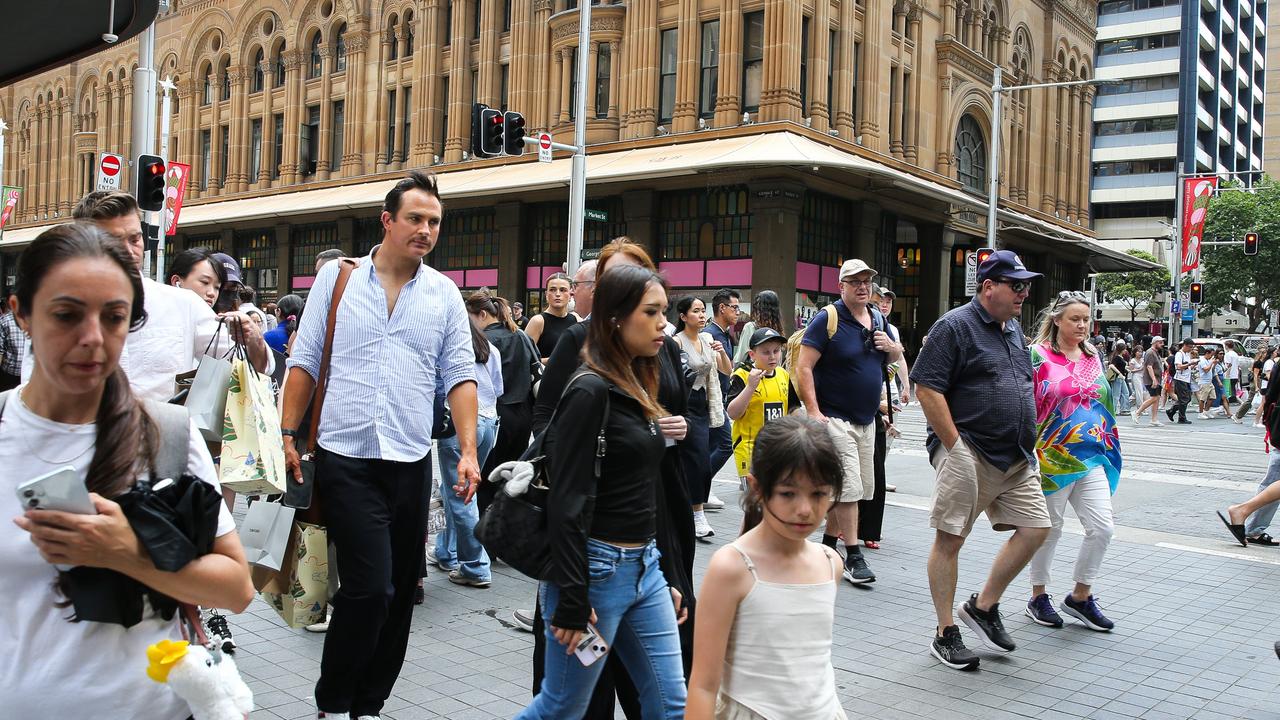National Disability Award winners recognised for improving lives of Aussies, including Mitchell Wilkes
Mitchell Wilkes, who was just 12 when he was told he was losing his sight, is one of many who are accessing vital, award-winning programs that help disabled Aussies lead fuller lives. See the award winners.
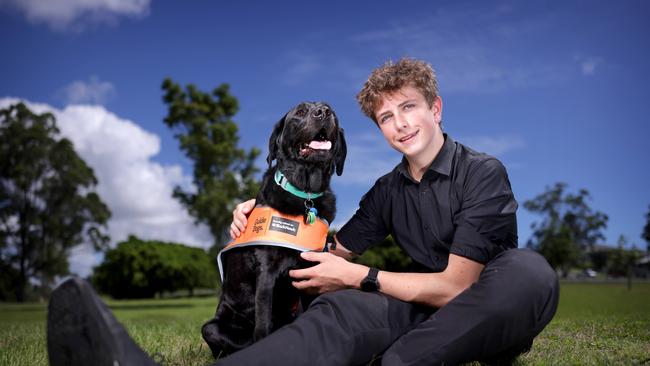
National
Don't miss out on the headlines from National. Followed categories will be added to My News.
Mitchell Wilkes was 12 years old when a doctor told him the shocking news – he was slowly losing his sight.
His mother Melanie first noticed that something was wrong when Mitchell was unable to read a car number plate located a few short metres away. His saxophone teacher had also begun to suspect he couldn’t read the music and was just memorising the notes.
That led to a “very blunt” conversation with an eye specialist, after which Mitchell’s world completely changed.
“The doctor was very clear about the fact that I probably wasn’t going to be doing a lot of the things that I wanted to be doing in the future,” Mitchell, now 15, said.
He left that doctor’s clinic, with a diagnosis of Stargardt disease, characterised by a slow loss of central vision that begins in childhood and sometimes leaves those with it completely blind by the age of 30.
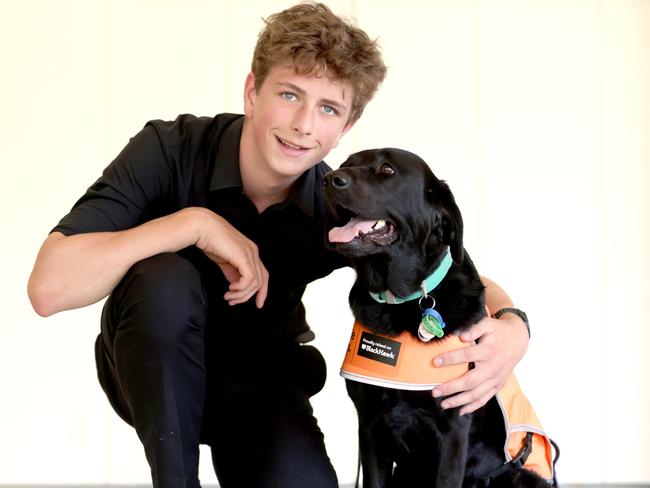
Mitchell was referred to Guide Dogs Queensland, where staff including psychologists, help people come to terms with their vision loss, as well as offering practical help.
“This is one of the many things that people don’t talk about or don’t consider; the psychological impact for a person as they are going through different stages of vision loss,” said Dr Sau Kuan Cheong, a clinical psychologist, who has just won a National Disability Award, for her work.
“Imagine that shock as you’re receiving the diagnosis?
“We describe it as symptoms that are very similar to loss and grief.”
Mitchell, who has received emotional support, as well as a white cane from Guide Dogs Queensland, may one day need a guide dog. For now, he’s managing with his white stick and his gutsy attitude to life.
“The way I access resources has changed,” Mitchell, from Toowoomba, said about school and learning. “I use a big laptop and an iPad to zoom in on things. I do a lot of listening. I’ve had to find ways of doing school differently without having to use my vision.”
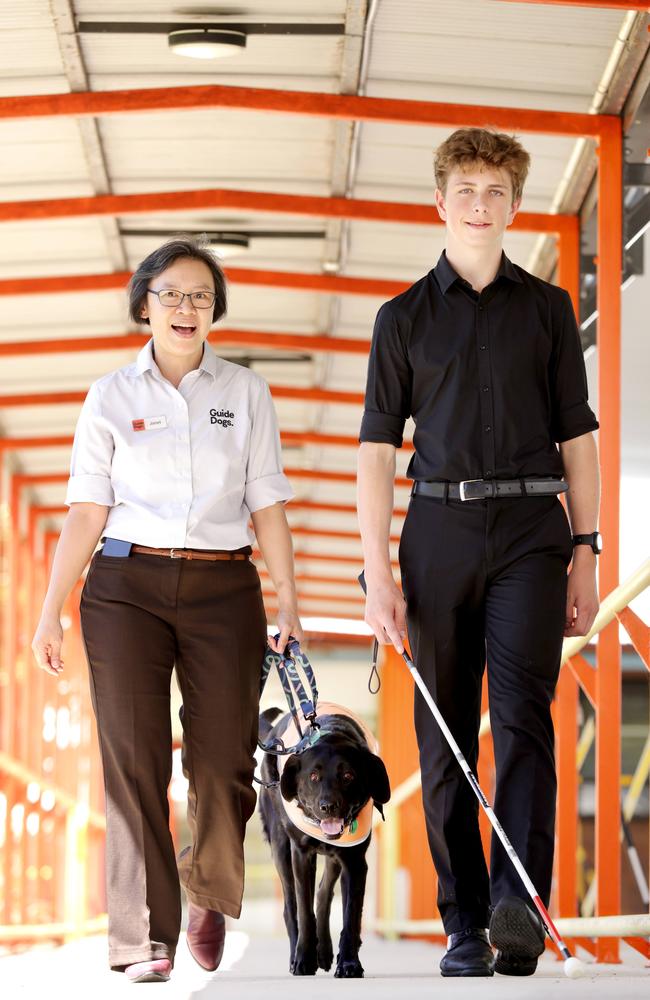
Mitchell, who hopes to work in podiatry or compose film scores, doesn’t believe that his blindness will inhibit him from achieving his goals in life.
Since his diagnosis, Mitchell has gone skydiving, walked the Larapinta Trail and even marched to Everest base camp with his family.
Meanwhile, another award-winning program, run by the Australian Federal Police (AFP), is also helping disabled people live a fuller life by employing those who are neurodiverse.
One benefactor is Matthew Crowley who doesn’t know what his ‘dream job’ is, but thinks what he is doing now is pretty close.
The 29-year-old from Canberra is working in software programming and development and said it’s fulfilling knowing that his work for the AFP is for the “greater good”.
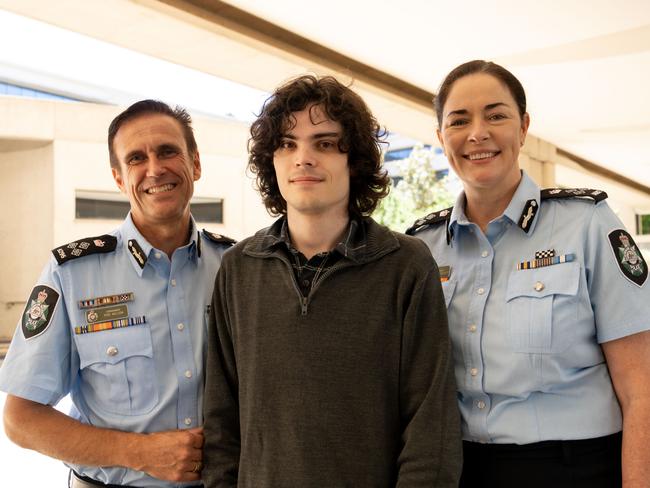
Mr Crowley, who has been diagnosed with autism spectrum disorder, ADHD, OCD and dyslexia, has had difficulty finding jobs and talking to people.
When an opportunity to join the Dandelion Program arose, he jumped at it.
He said being neurodiverse in the workplace can be challenging and small things can be problematic for people who have autism, such as the scented hand soap which would cause him discomfort to the point he was unable to work.
The AFP changed to unscented hand soap to accommodate Mr Crowley’s sensory processing disorder, making “everything so much easier to deal with”.
AFP Commander Covert & Technical Operations Robert Nelson said the two-year program is “the AFP’s innovative way of attracting people with the required skills”.
“Problem-solving is critical and it has been incredible to see how the neurodiverse skill set of the Dandelion trainees has benefited the work we do,” Commander Nelson said.
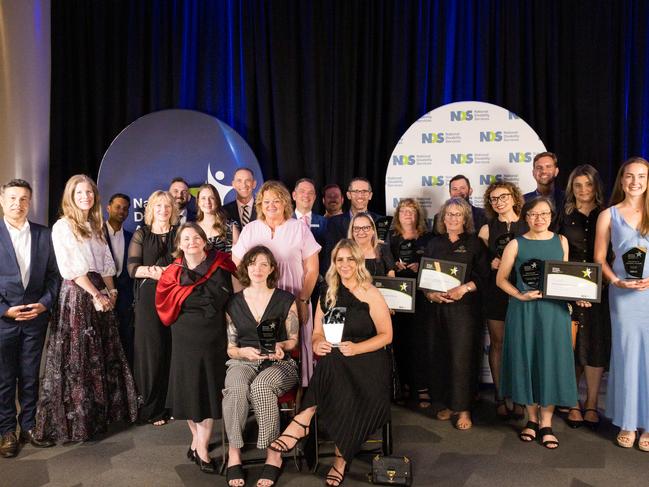
Mr Crowley said being neurodiverse allowed him to “see things from a different perspective, draw different conclusions, be really hyper focused and look at all the intricate details people might overlook”.
He said he had found a job where his “individual talents are valued and they’re being used”.
Commander Nelson also commended Mr Crowley’s “contagious sense of enthusiasm” which has opened the eyes of the rest of the team to the value of diversity.
CEO of National Disability Services, behind the awards, Michael Perusco praised the disability providers for improving people’s lives.
“Our winners and finalists are real life examples of how innovative our sector is and showcases the very real difference that people working in this sector make to the lives of people with disability and the communities we live in,” Mr Perusco said.
National Disability Awards Winners and Finalists
Excellence in Disability Support
WINNER: Bridget Muir, Winner (Perth, WA)
Moov360
An occupational therapist and fitness instructor, Bridget Muir founded Moov360 to use fitness and social activities to build the confidence and capacities of people with disability and complex mental health conditions. Whether working one-on-one with a client on their job skills or leading an exercise class in a safe and accepting environment, Bridget empowers her clients to reach their goals, build their independence and face everyday challenges with confidence.
Lisa Van Sitter
Endeavour Foundation
As a Home Site Supervisor at Endeavour, Lisa supervises her team while supporting people with disability to gain greater independence.
Team Wendy and Caroline
Crosslinks
Wendy and Caroline day-to-day support for six residents and work hard tyo make the daily routine fun.
Allied Health Professionals Award
WINNER: Dr Sau (Janet) Kuan Cheong Winner (Brisbane, QLD)
Guide Dogs Qld
Client Support Manager at Guide Dogs Queensland, Doctor Janet Chau, helps her clients adjust psychologically to life with no or little vision. Vision loss can affect every aspect of a person’s health, especially mental health, and Janet’s clinical excellence and her leadership of a diverse allied health team has supported dozens of people through tough transitions.
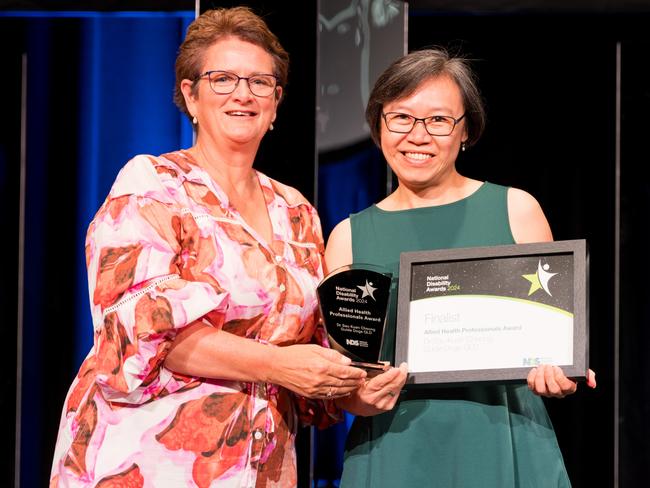
Dijana Dragicevich
Bloom Healthcare
As manager of the speech pathology team at Bloom Healthcare, Dijana Dragicevich’s fosters an ethos of compassionate care.
Positive Behaviour Support Team
Community Living Options
At Community Living Options, the Positive Behaviour Support Team delivers culturally
appropriate support that gives people with disability choice and control.
Excellence in Regional and Remote Support (individual and team)
WINNER: Swan Hill Discoveries Winner (Tooleybuc, NSW)
Echuca Discoveries Pty Ltd
Swan Hill Discoveries connects with resources already in their community to support people with a disability.
Marie Shield
Aimbig Employment
In the Western Downs of Queensland, distance is a big obstacle for jobseekers with a disability. As Team Leader at Aimbig Employment, Marie Shield has a Mobile Support Unit that regularly visits far-flung townships and Lunch-and-Learn sessions to build job-ready skills.
Guide Dogs Queensland
The Canine Team
Their specialised Guide Dog service team travels to regional areas, live in the community and give personalised training and support to clients.
Outstanding Leader of the Year
WINNER: Leicha Meteer Winner (Tiwi Islands, NT)
CatholicCare NT
As Daily Living Co-ordinator for Catholic Care on the Tiwi Islands, Leicha Meteer has created a big impact with the culturally sensitive way she has organised local disability support.
Ben Moberley
Guidestar
Principal Psychologist and General Manager of Community Services, Ben Moberley leads a team of thirty at Guidestar and manages their Positive Behaviour and Specialist Support Coordination services.
Greg Luck
Aimbig Employment
As the CEO of AimBig Employment, Greg Luck breaks down barriers to employment for his clients with a disability.
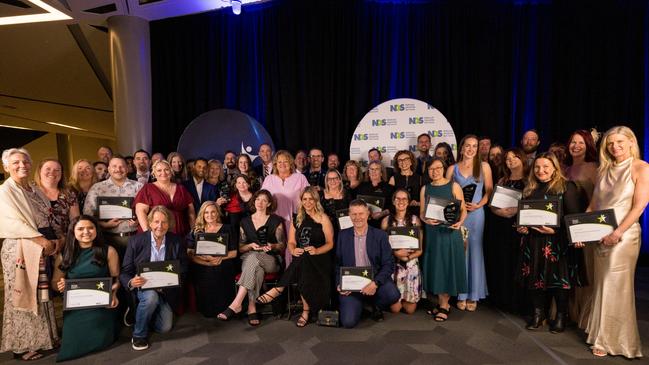
Excellence in Innovation
WINNER: Women with Disabilities Victoria (Melbourne, VIC)
Women with Disabilities Victoria created “Changing the Landscape”, a set of resources for governments, community professionals and disability service providers to prevent violence against women with disability. Joining up with anti-violence organisation Our Watch, Women with Disabilities Victoria translated the best and latest studies on the subject into a framework for government policy and action. The accompanying set of videos, audio clips and posters show care professionals and disability services how to recognise the risks and take the right action.
iNDEPth
GenU
Since people with autism face disproportionate rates of unemployment, GenU, through its employment service MatchWorks, has developed an innovative Neurodivergent Employment Program, iNDEPth. And since every autistic person is different, iNDEPth identifies individual strengths that, with training and encouragement, can be turned into unique assets that employers want.
MEP Marketplace
Microenterprise People Inc
MEP Marketplace is a groundbreaking shop in the Perth CBD, where more than 30 micro-enterprises, run by people with disability, promote and sell their wares and services. The shop is staffed by people with disability on full retail wages.
Excellence in Regional and Remote Support
WINNER: Carer Solutions Winner (Melbourne, VIC)
Since 2020, Carer Solutions’ one-of-a-kind Direct Employ service has been a boon for people with disability in small towns and remote communities. It solves the worker shortages out in regional Australia by allowing participants to hire someone they know and trust — a family friend, a neighbour or someone from their social club. All the participant need do is nominate the person and Carer Solutions will take care of the rest.
Guide Dogs Queensland
Over the years, Guide Dogs Queensland’s services have expanded across the state, taking on the challenges of vast distances, isolation and poor infrastructure, especially for First Nation communities. With a combination of on-the-ground visits from teams of allied health professionals, partnerships with optometrists, and innovative use of tele-practice and other remote technologies, Guide Dogs Queensland have made a big difference to small communities.
My Pathway Disability Supports
Responding to service gaps in Cape York and the Gulf of Carpentaria, My Pathway decided, if they want better outcomes for participants, costly and inconsistent fly-in-fly-out support was not the way to go. Their solution of recruiting and training a skilled support workforce from the community has given consistency, cultural connection and better outcomes for people with disability in these remote places.
Excellence in Service Quality
WINNER: Deaf Connect (Moorooka, QLD)
The key to Deaf Connects’ excellence in serving its community is that it is a deaf-lead organisation, with people with lived experience taking up crucial roles from the boardroom to management to face-to-face support. Not only does this allow the organisation to quickly identify gaps in services and create solutions, but it makes sure that everything it does is steeped in deaf identity, culture and community.
Help Enterprises
For more than fifty years, Help Enterprises has supported people with disability to lead independent lives through employment in their many businesses. But it is through recent initiatives to encourage employees to add their voices to the running of their businesses that has truly cemented a rights-centred, co-design philosophy at Help. Through supported committees and other programs, Help Enterprises gets the feedback they need for continuous improvement, while participants get richer connections to their work and community.
Metanoia Rays
Delivering a diverse range of support services from the Top End to Melbourne, Metanoia Rays believe that a human rights approach will always create a better life for people with disability. Co-design is part of everything they do, and cultural sensitivity is crucial. The company has found that ensuring their clients have autonomy, choice and freedom of expression becomes a feedback loop in the organisational culture, a virtuous circle of increasing rights-awareness and continuous improvement.
Inclusive Communities Award
WINNER: AFP Dandelion (Canberra, ACT)
Looking for ways to foster greater diversity and inclusion among its ranks, the Australian Federal Police joined forces with DXC Technology and Untapped Talent to place several neurodivergent trainees in the AFP’s Information Technology section. The success of the initial Dandelion program led to a second, based in the AFP Cyber Security branch. With tailored support and a full-time support consultant, the new recruits have transformed the culture at the AFP as much as they have transformed their lives.
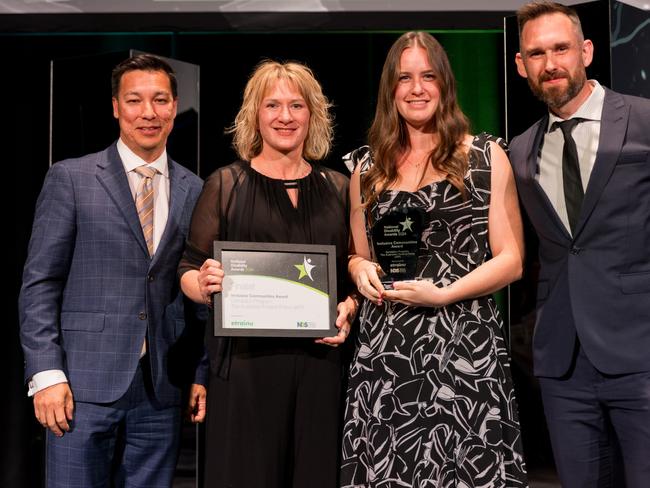
BoilOver Performance Ensemble
For fifteen years, Boilover’s intricate physical theatre performances have delighted audiences and challenged perceptions in their own community in Sunbury, Victoria, and in major arts festivals. Collaborating with professional artists across a range of skills, the ensemble creates high-quality works that challenge and change perceptions. By creating a safe, supportive and fun environment for people with disability to develop their artistic skills, the ensemble supports their growing emotional literacy, self-esteem and social networks.
Gig Buddies
ACL Disability Services
Gig Buddies tackles social isolation for adults with mild to moderate learning disabilities and autism by linking them with volunteers who share their interests. Having someone to go to the movies with, or to the pub to listen to a band, or to see the game can be life-changing for many people with disability. Many strong friendships have blossomed among the 160 pairings, and Gig Buddies’ regular in-person and online socials further dispel feelings of being alone.
Media Award
WINNER: Kelly White (Wollongong, NSW)
The Disability Trust
Videographer Kelly White created “Maddi’s Employment Success Story” short video.
Shown widely at conferences, the video has convinced other organisations and councils of the benefits of inclusive employment.
ABC and Dominic Cansdale and the Make Me Feel Good podcast (Qld)
Aruma’s Happy Place Entertainers
Dominic Cansdale’s story for the ABC’s Make Me Feel Good podcast in April 2024 followed the Happy Place Entertainers as they visited an aged care home on the Gold Coast. Their show of songs, dance and skits, supported by provider Aruma, was devised and performed by people with disability.
A Few Good Men podcast, hosted by Murray Jones (national)
Help Enterprises: Denver Fresser, Jacob Irvine and Lara Thompson
Hosted by Murray Jones, the Few Good Men podcast speaks to men about raising children with disability. As a father of a child with autism, Murray knows the importance of creating an understanding and protective space where men can tell their stories of joy, hardship and unexpected paths.
More Coverage
Originally published as National Disability Award winners recognised for improving lives of Aussies, including Mitchell Wilkes



